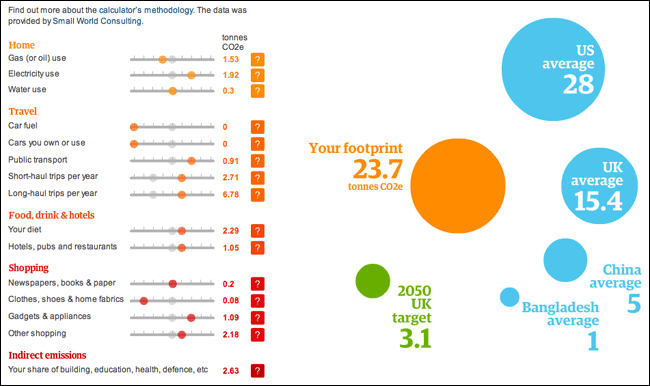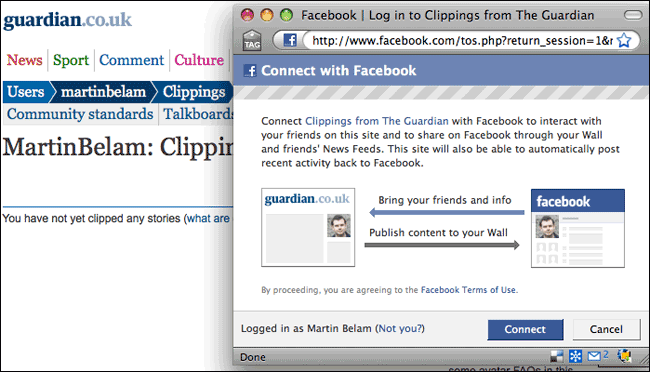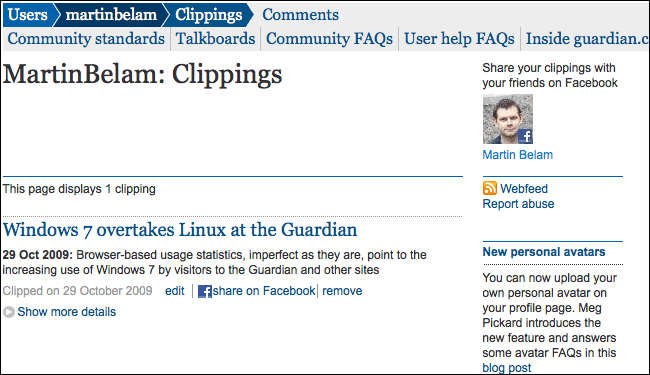Carbon, clippings and checking out Wave - more cool stuff on guardian.co.uk
Last week, when I was writing about the Jane Bown interactive gallery on The Guardian site, I mentioned that there were several other things done recently that had really impressed me. In no particular order, and stressing again that these have been nothing to do with me, here are another three things that stood out over the last few weeks.

Quick carbon calculator
I remember a conversation I had a while back with Simon Willison where he was explaining the difficulty of calibrating the scale on carbon calculators, to avoid people concluding that all their efforts to reduce their carbon footprint were futile compared to the impact of flying and the output of the national grid. The Guardian's new personal carbon counter tries to mitigate this by including within the figures a chunk representing how our individual share of the nation's infrastructure factors into the calculation.

It was produced by the Guardian Professional digital agency. My colleague Mairead O'Conner was product manager on it, and has blogged about the carbon calculator. She says:
"For indirect emissions, we considered making this a range based upon whether you used a lot of public services a lot, but ultimately we decided to make everyone use the average UK figure. This is because it's very hard to know how you compare to the average and there's not much you can do to change it."
The message seems to be getting across, as some of the user comments on this piece point out:
"Very, very, telling. I have just gone through the calculator and set everything to 'pauper' mode basically, and I'm still over the average Chinese citizens emissions. I'm talking, no heating or lighting, no running water (plainly impossible) buying clothes every couple of years, never flying, never owning a car, somehow moving closer to my workplace, really carefully monitoring my diet to make it seasonal and mainly vegetarian and never buying anything that could even be remotely construed as a luxury (no books, magazines, no internet, tv, phone etc) All that and we're still higher on average than China. The message here is clear, CHANGE NEEDS TO BE MADE AT AN INSTITUTIONAL LEVEL!"
With the recent revelation that none of the top ten Conservative bloggers believe in man-made climate change, the chances of an incoming Conservative Government making those institutional changes looks pretty slim at the moment.
Facebook Connect for 'Clippings'
If you have a Guardian user account, then you can 'clip' articles and save them in collections on guardian.co.uk. We've recently added the ability to cross-post (or should that be cross-clip?) them to Facebook. Using 'Facebook Connect' with the clippings functionality was initially done as an experiment by Chris Thorpe. It is the kind of agile prototyping that is allowing us to get some applications deployed really quickly - the MPs Expenses crowd-sourcing tool was another example.

With the Facebook Connect implementation, Chris also published some code snippets and a screencast of how he put the system together on the Open Platform blog.

My only problem with it is that 'seamless integration with social platforms like Facebook' is one of the standard bullet points on my 'in the future there will be robots' slides about potential directions for The Guardian website. And Chris and a couple of other developers got 'the future' up and running on the site in the space of a few days. Now I have to find a new shiny future to promise... ;-)
Google Wave dev lab
There are a few things built into The Guardian's development process which I think give us a real advantage over every other technical department I've worked in before. I've avoided blogging about them to help keep it that way! However, Lisa van Gelder and Martyn Inglis have broken cover about the Developer Dev Labs we have, with a couple of posts on guardian.co.uk about their recent exploration of Google Wave. Martyn described the Dev Lab process as similar to a Hack Day, but:
"Whereas on a Hack Day there are twenty four hours to attack the problem and the goal is a working demo, even if it is hanging together with duct tape, a DevLab is a more considered beast. The concept is similar, to examine something outside of the normal working scope, but the time-scales and outcomes are different.
The DevLab process is basically a simple one. A proposal is made to the departmental management team, in this case what is a Google Wave and how, if at all, is it relevant for us as a company. Once approved the developers are taken completely out of the standard development process for five days.
This period is to be spent on investigation. There is no requirement for a working product that can be released or even demoed. Rather the outcome is understanding, and for this understanding to be spread throughout the team. "
If you are one of those people who still cling to the notion that the news industry isn't now part of the technology business, and that the IT department are just there as code monkeys not thinking about the journalistic implications of their programming, then you should definitely read Martyn's blog post. He makes some really thoughtful observations about how The Guardian might approach using wave-like technology, looking at how this distributed type of real-time content might scale for a publisher, and how potential legal problems might scarily scale up with them.
Incidently, I'm on Google Wave myself, so if you fancy inviting me into any interesting Waves around user experience, information architecture or online journalism then please ping me about them - martin.belam@googlewave.com
I think this is an awesome little calculator! Never hurt anyone to know how much they are harming the world!
The Guardian's new personal carbon counter - seems to be a lot of fun, but actually doesn't serve for entertainment purpose only. It is just another reason to think about what we are doing and what we are doing wrong.